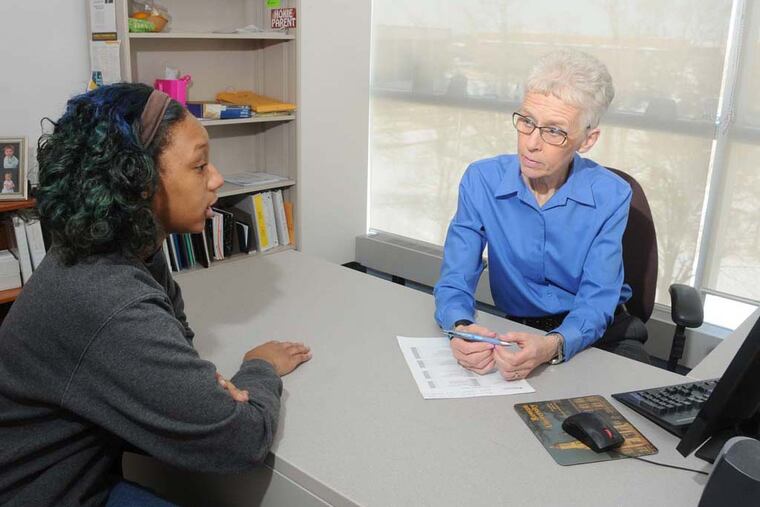Rowan emphasizing student advising
Rowan University wants to do better: more freshmen coming back as sophomores, more students passing all classes in the right sequence, more students graduating in four years.

Rowan University wants to do better: more freshmen coming back as sophomores, more students passing all classes in the right sequence, more students graduating in four years.
Within a few years, according to current plans, every Rowan student will meet regularly with an assigned professional academic adviser and a faculty mentor, with the goal of boosting retention and graduation rates.
"If we are going to maximize the impact of education and minimize its cost, then make sure that as many people who come in graduate with a degree and do so in as little time as possible. . . . Make sure that as large a percentage of those as possible have every opportunity to succeed, and as efficiently as possible," said Jim Newell, Rowan's provost.
This school year, Rowan has nearly doubled the size of its academic advising staff, expanded the use of a universitywide data system that tracks student performance, and created staff positions focused on early intervention when academic trouble is detected.
The focus on academic success comes amid an aggressive expansion plan that includes doubling enrollment in 10 years. Rowan's responsibility, Newell said, is to ensure that it maintains and increases quality as it grows.
"If you're getting better advising and more direct connections, we are more likely to prevent a problem that is going to prevent a delay in your graduation," Newell said.
Like many schools, Rowan has long depended on faculty members to serve as academic advisers. But with ever greater pressure to quantitatively demonstrate student success, colleges and universities have shifted to professionalizing advising. Some invest in greater training for faculty members; others put the money toward hiring dedicated advisers.
"It's probably one of the issues in higher education that has undergone the most study, the most tweaking and correction, and still garners the most concern, because it seems that we can never quite get it right," said Jillian Kinzie, associate director of the Center for Postsecondary Research at the education school at Indiana University in Bloomington.
Nationally, student success rates have become more important for the federal government, college and university accreditors, and private organizations such as the Lumina Foundation, Kinzie said.
Schools in the region have responded in various ways. Stockton University has beefed up dual-enrollment high school programs; William Paterson University created a "Finish in Four" graduation program; and Rutgers-Camden created eight-semester templates.
In Philadelphia, Temple University has doubled its professional advising staff; tailored advising to specific student populations, such as athletes; and rolled out a "Fly in 4" program that includes mandatory advising sessions each semester. The school's freshman retention rate has risen nearly six percentage points in six years, said Peter R. Jones, Temple's senior vice provost for undergraduate studies.
"Imagine us as being the last leg of a 4-by-400 race, and the students have made their way through it, and the student has handed the baton to Temple at the start of that fourth leg," Jones said. "We are not going to drop that baton."
Rowan has hired 12 professional advisers this year, increasing its total to 26. Two years ago the university had 13.
Those advisers focus on the administrative side of academia: How are the student's grades? Does she have enough credits? Is he following the proper course sequence? Does she meet the prerequisites for courses for which she's registered?
About two-thirds of students currently have professional advisers, McElwee said. Within three years, she hopes to have a professional adviser assigned to each student.
That frees up professors to act as mentors, a role for which they are better suited.
"Faculty members are great with their subject matter and their research projects, but they're not necessarily experts on everything else that goes on around campus," said Carol A. Eigenbrot, who oversees the university advising center and has been an adviser at Rowan since 1996.
"As far as providing professional advising, we're here from 8 in the morning to 4 in the afternoon, whereas a faculty adviser is likely to just have office hours a couple of days a week," she said. "We're always available to students."
Career advising is also broken out into a separate specialty, with a focus on internships and postgraduation job placement.
"This is very much a team approach to student support," McElwee said. "So everyone at the university is involved in understanding what the issues are."
Last school year, Rowan fully adopted a computerized "success network" in which teachers can offer kudos or flag academic struggle.
"The key is to really have a broad picture of what's going on with the student, because you can be struggling in calculus, and if there's nothing really going on in your life, it's just that calculus is hard for you," Newell said. "But if you're struggling in calc and in history and in English, and you were a high-performing student in high school, something is going on."
The latest push to boost student success numbers began around 2009, McElwee said. From fall 2008 to fall 2013, the first-year retention rate for students entering through the regular admissions process rose to 88 percent, from 83 percent. The four-year graduation rate rose from 46 percent for fall 2008 freshmen to 53 percent for fall 2010 freshmen, according to data provided by McElwee.
Many other factors affect those numbers, including the rising academic profile of the freshmen class as Rowan admits an ever-higher average standardized test score and GPA.
Rowan's initiatives to boost student success appear to be working, McElwee said. "We very much view it as a worthwhile investment by the university.
"There are more steps than ever to support the undergraduate experience and to make sure that Rowan retains its original function, which was to produce wonderful undergraduate students."